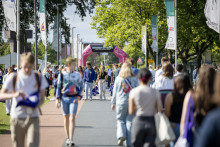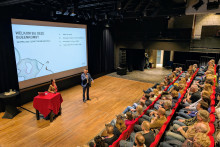Speakers, beginning with Rector Zijm, brought up sobering statistics throughout the day. For example, at the UT there are 127 male full professors and a mere 8 female full professors; associate professors are 87% male and 13% female. According to CBS, 6.7% of Dutch full professors are women, compared to an average of 15% in Europe overall. Dr. Mineke Bosch, associate professor in the Centre for Gender and Diversity at the University of Maastricht, informed participants that only 8 of the 200 KNAW (Royal Netherlands Academy of Arts and Sciences) are women. Sonia Heemstra de Groot, associate professor in Design and Analysis of Communication Systems and chief scientist for Twente Institute for Wireless and Mobile Communications, citing a 2004 Eurostat news release, reported that within the EU 58% of university graduates are women, yet only 40% of PhD recipients are female. It is worse in the Netherlands where only 31% of doctoral degrees are conferred to women.
Confronting the numbers is just one issue. What are the attitudes toward women in science and engineering? Bosch showed a documentary directed by Marian Tjaden, which is part of a VPRO project (`Waste of Talents') begun in 1998. Still a work in progress, the film deals in part with Dr. Nancy Hopkins, a molecular biologist at MIT, and her unwitting crusade to bridge the gender gap. The consequences of her actions led to the Study on the Status of Women Faculty in Science at MIT, published in 1999. Presenting the study to MIT faculty, President Charles Vest avowed, `I have always believed that contemporary gender discrimination within universities is part reality and part perception. I now understand that reality is by far the greater part of the balance.' Such bold acknowledgment on the part of a powerful figure in science and academics has enabled women scientists all over the world to raise issues of both blatant and subtle discrimination that they have discreetly suppressed for decades. During the same period in the Netherlands, a representative of the KNAW is on film saying, `If women want to become professors, they shouldn't think it will be easy. They must make choices - they will no longer be able to sew their own clothes.'
Heemstra de Groot offered solutions to the shocking scarcity of Dutch women in top positions in academia and industry. She suggested increased social support in the form of tax breaks, day care, school lunches. She would like to see an improved image of science and engineering nationwide. High school teachers should be targeted to guide girls toward a heavier orientation in math and science. There ought to be more female role models. And, she is a proponent of affirmative action. Heemstra de Groot concluded with the claim that until the Netherlands addresses the gender discrepancy, the country `will be handicapped with respect to European and increasingly global competition.'
No doubt at least one male reader is thinking, `Who cares if there are more women in science and engineering?' Answers to this tacit question were proposed all morning. There is a nationwide shortage of scientists and engineers; women are an untapped resource. Studies also show that women think and work differently than their male counterparts. They tend toward interdisciplinary approaches, which are demanded more and more in scientific research.
While he rejected a proposal that five women professors be added to each university, Rector Zijm was firm in his support for positive action to encourage more women to attain higher decision-making positions in engineering sciences, insisting that he is only `debating its form, not its principle.'
It was exhilarating to see so many brilliant professional women together in one place, discussing a concern they share but one about which they have almost no professional training. The atmosphere was earnest but relaxed, and overwhelmingly positive. Dr. Marianne Boenink, an assistant professor of Philosophy, recently back from maternity leave, said that the conference gave her pause to `reflect on my own position as a woman in the university.' Dr. Marina van Damme-van Weele, the first woman to earn a PhD from the UT, reminded junior colleagues to `be active, look for new challenges. No one gives chances; you have to ask for them.'
At the end of the conference, the Marina van Damme award was given to UT-alumnaThelma Stobbelaar. Epitomizing the professional woman struggling to balance the demands of career and family, Stobbelaar was unable to collect the award in person because she was giving birth at the time.








